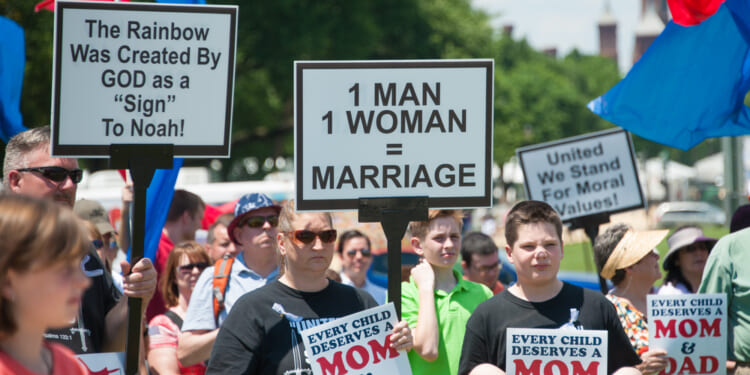Kim Davis’s request that the U.S. Supreme Court overturn Obergefell v. Hodges was, to put it mildly, a long shot.
There was, it seems, perhaps a little bit of hope among those of us who subscribe to that antiquated view of marriage that sees sexual difference as rather critical to the nature of the institution that the long shot would prove successful. But even the most hopeful among us have to admit that the court’s decision on Monday to pass on the case without comment was probably for the best.
After all, Davis’s case was hardly the ideal poster child for the job.
For one, her case hardly addressed the key issue at play in the Obergefell decision. Davis made national headlines by landing in jail for six days in 2015 after refusing to issue a marriage license to David Ermold and David Moore. In the court case that ensued, she argued that the state had infringed on her First Amendment rights by forcing her to issue marriage licenses to couples her faith told her could not possibly be married. (READ MORE by Aubrey Harris: We’re Winning the Marriage Fight in Spite of Ourselves)
That, of course, was an issue that Justices Clarence Thomas and Antonin Scalia foresaw in their dissenting opinion back in 2015. Of all the issues, legal and social, that Obergefell raised, the First Amendment one was relatively fixable. Mere months after Davis complained that affixing her name to marriage licenses issued to gay couples violated her religious beliefs, Kentucky removed county clerks’ names from all marriage licenses. Problem solved.
By the time she appealed the case to the Supreme Court, there were just two issues really at play: Davis (understandably) wanted out of paying more than $300,000 in damages and legal fees, and she wanted the court to reconsider Obergefell. While one could reasonably argue that the damages cited are a bit excessive, granting a win to Davis simply doesn’t require overturning legal precedent.
Besides, from a constitutional perspective, the issue with Obergefell isn’t necessarily that it infringes on the First Amendment rights of Americans who find gay marriage objectionable for religious or social reasons; rather, it’s that the whole case rests on a rather dubious constitutional argument based on the Fourteenth Amendment.
Obergefell, for those of you who haven’t read or thought about the case for the last decade or so, was decided based on the constitutional argument of substantive due process. When the Supreme Court looked at the issue in 2015, the five justices who signed their names on Anthony Kennedy’s majority opinion agreed that Americans have a constitutional right to “personal choices central to individual dignity and autonomy, including intimate choices that define personal identity.” States have no ability to restrict that right without “due process.” (READ MORE: SCOTUS: Preserve Gay Marriage but Protect Religious Rights)
The upshot? If homosexuality is critical to your “personal identity,” the U.S. Constitution recognizes your right to both practice it and call it “marriage.” Essentially, the court imagined a “right” no one would have claimed existed until about two decades ago, and then engaged in a little judicial activism to enshrine it in the American pantheon of natural rights.
The same argument, by the way, applied in Roe v. Wade, which imagined a “right” to abortion. When that case was overturned, Justice Thomas correctly noted that it would be worth revisiting other cases decided on the same judicial argument — Obergefell very definitely included.
Suspect constitutional argumentation aside, the whole Davis case illustrates something else about the current American moment. Americans, it seems, are increasingly willing to question the society liberals have been busily building for the last several decades.
Those of us who thought gay marriage was a done deal (and that was most of us, although we protested as a matter of morals) have been taken aback by recent polling illustrating that gay marriage — while still broadly supported (69 percent) — has taken a hit in recent years, particularly among Republicans (whose support for it has declined from 55 percent in 2022 to 46 percent in 2024).
Admittedly, conservatives can’t exactly take credit for the shift in public opinion — most of them, after all, have been busy combating far more egregious cultural issues (transing the kids, drag-queen story hours, and the rise of abortion-by-mail come to mind). The fault quite probably lies with liberals who tried to take liberalism too far.
Maybe it’s a bit optimistic to say, but it seems like we might very well be on the verge of seriously having a discussion about the whole gay marriage issue — something we were deprived of when Obergefell was forced down the throats of every American. From a cultural perspective, that’s a huge win.
READ MORE by Aubrey Harris:


![Scott Bessent Explains The Big Picture Everyone is Missing During the Shutdown [WATCH]](https://www.right2024.com/wp-content/uploads/2025/11/Scott-Bessent-Explains-The-Big-Picture-Everyone-is-Missing-During-350x250.jpg)













